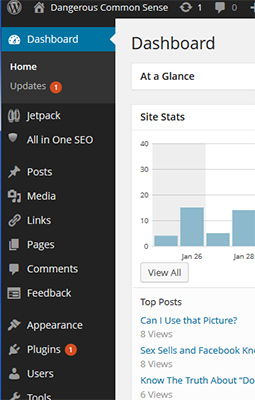The Care and Feeding of Your WordPress Site
You can’t just publish your WordPress website and forget about it for weeks, months, or years as you could for HTML-based pages. (See more on how WordPress sites are different in our previous post.)
A WordPress site needs:
- Updating of its modules to plug security holes that have been discovered.
- Monitoring of visitor comments. You’ll want to respond to questions or complaints, and you will want to encourage people’s comments.
- Watching for fake spam comments that are loaded with links to scammy sites.
- Regular, intentional back-ups.

Dashboard Showing 1 Update Pending
Fortunately, regular maintenance is neither difficult nor time consuming.
Here’s what we suggest.
- Sign on to your site administration account at least once a week. Pick Mondays at noon or another regular time
- Review the WordPress Dashboard. Any pressing tasks will be highlighted in red and also the number of tasks will be shown on the header line at the top. In the example at right, there is 1 Plug-In Update pending. If there were comments needing review or theme updates waiting, there would be a red number by those menu items.
- Click on the lines with red numbers showing, and follow the instructions. This process will bring your site up to the latest version of its software.
- Click on the “Comments” menu item and see the new comments have been posted site-wide. Click on ones you want to respond to.
- If your site allows any comments, install the Akismet plug-in to block spam comments automatically. The service is free for personal sites and $5/month for commercial sites.
- Set up an unattended backup so that you will have access to a copy of your live system in case something unexpected happens to your hosting service or software.
- We use Updraft for the sites we create. The full-featured version allows us to stage a site, show it to a client, and then migrate it to the client’s live URL. For your website, if you don’t need any special functionality, you maybe able to use Updraft’s free version. Or, buy your own license for $60/year.
- You, or your web developer, can install the backup program when your site goes live. Establish a regular schedule for the backups and test the procedures.
Because WordPress sites are dynamic and can be updated from different locations, your maintenance activity is critical, if not terribly time consuming. Besides, although this post is written saying that YOU, the website owner, have maintenance tasks waiting for you with a WordPress site, you can delegate your responsibility. Ozdachs will do regular or ad hoc maintenance on your WordPress site. Or, you can assign the routine work to a techy in your organization.
Want more information? Leave your questions here, or call us at 415.347.6479 for a private response.



